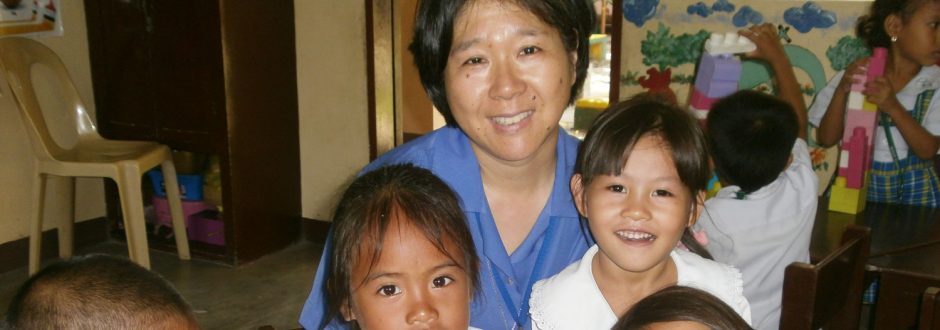A life inspired by joyfulness has supported Sister Eiko Mukae SGS in her ministry as a Good Sam and walking with the poor in the Philippines.
Interview: Patty Fawkner SGS Words: Annette Loughlin-Smith
“Joyfulness” was Eiko Mukae’s first impression of the Sisters of the Good Samaritan, which was formed as a young high school student studying at Seiwa High School for girls in Sasebo, which is about 50 kilometres north of Nagasaki on the east coast of Japan.
“The Sisters were joyful. They are very joyful,” Eiko reflects on her time at the school and why she was drawn to a vocation as a Good Samaritan Sister.
Now known as Seiwa College, which means “holy peace”, the high school was founded by the Good Sams after answering an appeal from the Bishop of Nagasaki, Paul Yamaguchi, to help rebuild his diocese which had been devastated by the 1945 atomic bomb.
The Sisters worked in Nagasaki for four years before establishing communities in Sasebo and Nara, which is further inland west of Osaka, and eventually built the high school and Kindergartens, as well as ministering in the local parishes.
Making her profession in 1988, after studying two years of infant education, Eiko taught at Our Lady of the Cherry Blossom Kindergarten in Sasebo before her first mission to the Philippines in 1993, where she was involved in the Good Sam’s ministries including feeding programs and parish visitation. She also worked as an aid at a day care centre and in the scholarship program.
Eiko felt called to work in the Philippines because she wanted to “walk” with the poor.
“I wanted to be with the poor,” she says. “There are many people who are very happy there even though they don’t have food or are unable to study,” she said.
“They are happy because they are living by faith; they have a deep faith,” Eiko reflects.
About 90 per cent of the Filipino population is Christian – mostly Catholic – which is in sharp contrast to Japan where only about one per cent of the population is Christian.
Eiko returned home to Japan in 1996 and continued teaching at the Kindergarten in Seasebo for three years. She then taught at Nara Catholic Kindergarten until 2003, before returning to the Philippines where she would stay for 14 years.
“I was teaching for the Good Samaritan Kinder School in Bacolod in the Philippines,” Eiko says. “Education is important to the Good Sams and helping those in need.”
The Kinder school, which teaches around 130 children a year, is part of the pioneering work of the Good Sams from Japan who established a foundation in Bacolod in 1990. This work has expanded to provide scholarships for high school, college and university students as well as seminarians.
The Sisters also work in prison ministry and have also established the Good Samaritan Centre, which provides outreach and adult education, as well as food programs.
Featuring in the 2015 short film, “A Consecrated Life”, on the life and mission of the Good Samaritan Sisters, Eiko said life was challenging in the Philippines.
“Living in another country and using another language is challenging, but that challenge makes me more humble,” Eiko reflected in the film. “I have to accept myself and be an instrument of God…why I am here in the Philippines is to bring Christ to the people and the love of neighbours.”
Her greatest joy of missioning in the Philippines was not what she did, but being with the Filipino people.
“It was living there with the poor. It’s not important what I did, but that I was with them,” she says. “And what is the most important is to be there with them – to respect them and their life, culture and condition.”
It was a difficult decision to return to Nara in 2017, but Eiko felt it was time to return to her community in Japan.
Despite being 18 years younger than the next youngest sister, Eiko doesn’t feel there is much of an “age difference”, but recognises the importance of living in community with the Sisters who have always accepted and supported her.
She is in the fourth and final year of a Psychology course, which she is studying by correspondence at Kyoto Tachibana University.
“Psychology is really about human insight,” Eiko says. “It’s learning about self and others, and how I can adjust to others.”
“It’s important to meet and engage with the people in a positive way. They also feel that positive way and see their gifts and not their weaknesses,” she says. “This allows them to change in a positive way.”
When she completes her course, which she is studying more for personal growth than to become a Psychologist, Eiko will continue her ministry in parish pastoral work and infant education. She believes the parents and families are in as much need of support as the children.
Eiko has found the “joyfulness” of life as a Good Samaritan Sister. She finds it in walking alongside people
“For me, people are just as important as faith and global environment,” she adds.
“Love is the most important. It’s not easy to love, we have to patient with it,” she says. “Selfishness makes it harder.”
Eiko’s words echo Chapter 72 of the Rule of St Benedict:
They should each try to be the first to show respect to the other, supporting with the greatest patience one another’s weaknesses of body or behaviour, and earnestly competing in obedience to one another.
“We have to be open to the other – open eyes and open hearts – that is why community life is important. I always seek God’s message. What is God telling me today?” she says.
“And I always search for the peace in daily life.”
It’s why Eiko Mukae exudes joyfulness.
